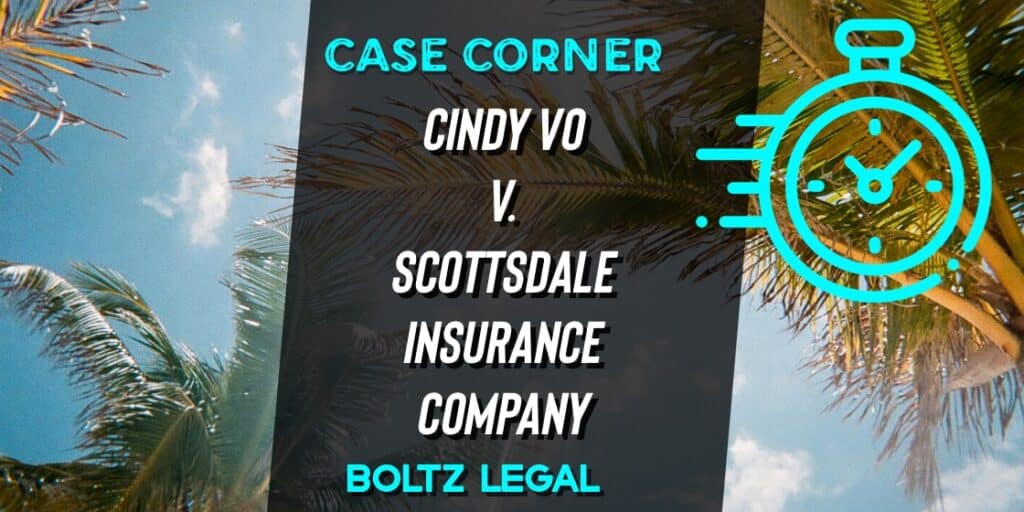First District Court of Appeal, State of Florida
Case No. 1D2023-2228
Opinion Filed: February 26, 2025
Judge: B.L. Thomas
Insurance – Bad Faith Claims – Extracontractual Damages – Retroactive Application of Statutes – Reversal of Dismissal
Background of the Case
This case addresses whether Florida’s new bad faith statute, § 624.1551, can be applied retroactively to bar an insured’s bad faith lawsuit when the claim originated before the statute’s enactment. The First District Court of Appeal ruled that the law cannot be applied retroactively, reversing the trial court’s dismissal of Cindy Vo’s bad faith claim against Scottsdale Insurance Company.
Factual and Procedural History
1. Hurricane Damage and Insurance Claim
- In 2020, Cindy Vo (the “Insured”) filed a claim with her insurer, Scottsdale Insurance Company, for hurricane damage to her property.
- Scottsdale estimated damages at only $420.64, determining that no storm-related damage existed to the exterior and that the interior damage was unrelated.
- The policy’s wind deductible exceeded the estimated damages, leading Scottsdale to deny payment.
2. Appraisal Award and Settlement
- The Insured’s public adjuster estimated damages at $38,584.
- Scottsdale conducted a second inspection, which reaffirmed its initial findings.
- The Insured filed a Civil Remedy Notice (CRN) alleging breach of contract and bad faith claims handling under § 624.155, Florida Statutes.
- An appraisal panel awarded $34,545.66, leading to a settlement in 2021, where Scottsdale paid the appraisal amount minus the hurricane deductible.
3. Florida’s 2022 Bad Faith Law and the Insured’s Lawsuit
- In March 2023, the Insured sued for extracontractual damages, citing Scottsdale’s bad faith claims handling and violations of § 624.155(1)(a) and (b), Florida Statutes.
- Scottsdale moved to dismiss, arguing that the newly enacted § 624.1551, Florida Statutes (effective December 16, 2022), required a prior court adjudication that the insurer breached the contract before any bad faith claim could proceed.
- The trial court granted dismissal, agreeing that the Insured had not met the prerequisites of § 624.1551.
Legal Issues and Arguments
1. Scottsdale’s Argument for Dismissal
Scottsdale argued that:
- § 624.1551 requires an insured to obtain a court ruling that the insurer breached the contract before filing a bad faith suit.
- Since the Insured settled without an adverse adjudication, her bad faith suit was statutorily barred.
- The new statute should apply retroactively to govern all pending bad faith claims, including the Insured’s 2023 lawsuit.
2. The Insured’s Counterarguments
Cindy Vo challenged the dismissal, asserting:
- Her bad faith claim vested in 2021, when the insurer paid the appraisal award.
- § 624.1551 cannot be applied retroactively, as it imposes new legal burdens and eliminates previously valid causes of action.
- The appraisal award itself provided sufficient evidence of bad faith, even if it did not meet the new statutory definition of an “adverse adjudication.”
Court’s Analysis and Ruling
1. Presumption Against Retroactive Application of Laws
The court reaffirmed that statutes are presumed to apply prospectively unless the Legislature clearly expresses retroactive intent.
“There is a presumption in favor of the prospective application of statutes.”
— Arrow Air, Inc. v. Walsh, 645 So. 2d 422, 424 (Fla. 1994)
The court recognized that § 624.1551 was enacted after the Insured’s bad faith claim arose, meaning that applying it retroactively would impose a new legal burden on the Insured.
2. Eliminating a Vested Cause of Action Violates Florida Law
The court emphasized that laws affecting substantive rights—such as eliminating a previously valid cause of action—cannot apply retroactively unless explicitly stated by the Legislature.
“Even where the Legislature has expressly stated that a statute will have retroactive application, this Court will reject such an application if the statute impairs a vested right, creates a new obligation, or imposes a new penalty.”
— Menendez v. Progressive Exp. Ins. Co., 35 So. 3d 873, 877 (Fla. 2010)
Since the Insured’s bad faith claim vested before § 624.1551 became law, retroactively applying the statute would impermissibly strip her of an existing legal right.
3. Legislative Intent and Statutory Purpose
Scottsdale contended that § 624.1551 is a “remedial” statute, meant to curb rising insurance costs by reducing litigation. However, the court rejected this argument:
- While the law has a remedial purpose, it creates new legal barriers to filing bad faith claims, making it substantive rather than procedural.
- The statute cannot be deemed “remedial” simply because it benefits insurers by making it harder for policyholders to sue.
4. The Appraisal Award and Bad Faith Evidence
The court acknowledged that while the new statute excludes appraisal awards as proof of bad faith, the law did not apply to the Insured’s case.
“The difference between an insurer’s appraiser’s final estimate and the appraisal award may be evidence of bad faith under s. 624.155(1)(b), but is not deemed an adverse adjudication.”
— § 624.1551, Florida Statutes (2022)
Since the Insured’s claim vested before the statute took effect, the trial court erred in dismissing the case based on § 624.1551’s new requirements.
Final Judgment
The First District Court of Appeal reversed the trial court’s dismissal, ruling that:
- § 624.1551 cannot be applied retroactively to bar the Insured’s previously vested bad faith claim.
- The Insured was not required to obtain an adverse adjudication before suing for bad faith, as her cause of action accrued before the law changed.
- The case is remanded for further proceedings, reinstating the Insured’s bad faith lawsuit.
Key Takeaways: Retroactivity and Bad Faith Insurance Claims
- Florida statutes do not apply retroactively unless the Legislature explicitly states otherwise.
- § 624.1551 imposes new legal barriers to bad faith claims, making it substantive rather than procedural.
- Vested rights cannot be retroactively eliminated—once a claim accrues, subsequent legal changes cannot invalidate it.
- Appraisal awards can be used as evidence of bad faith, even if they do not independently establish an insurer’s liability.
This decision clarifies how Florida courts will handle bad faith claims filed before the enactment of § 624.1551, protecting policyholders from unfair retroactive application of new legal restrictions.
Todays Insight:
“Laws should not apply to past events in a way that changes the rules after the game has already been played.”
— Oliver Wendell Holmes Jr.
Legal fairness means ensuring that policyholders’ rights are protected, even when the laws change after the fact.

